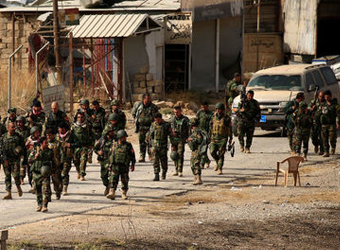Kurdish authorities said on Friday they had sent thousands more troops to Kirkuk to confront “threats” of Iraqi military attack, but also pulled back defence lines around the disputed oil-producing area slightly to ease tensions.
The Baghdad central government has taken a series of steps to isolate the autonomous Kurdish region since its overwhelming vote for independence in a Sept. 25 referendum, including banning international flights from going there.
Baghdad’s tough line, ruling out talks sought by the Kurds unless they renounce the breakaway move, is backed by neighbours Turkey and Iran given their own sizable Kurdish minorities – and a long-running Kurdish insurgency in Turkey’s case.
Tens of thousands of Kurdish Peshmerga soldiers have been stationed in and around Kirkuk for some time and another 6,000 have arrived since Thursday, Kosrat Rasul, vice president in the Kurdistan Regional Government (KRG), said on Friday.
The KRG Security Council expressed alarm late on Thursday at what it called a significant Iraqi military build-up south of Kirkuk, “including tanks, artillery, Humvees and mortars”.
“These forces are approximately 3 km (1.9 miles) from Peshmerga forces. Intelligence shows intentions to take over nearby oil fields, airport and military base,” it said in a statement.
Kurdish security sources later said that the Peshmerga had shifted their defence lines by 3 km (1.9 miles) to 10 km south of Kirkuk to reduce the risk of clashes with Iraqi forces, which then moved into some of the vacated positions without incident.
The area from which the Peshmerga withdrew is populated mainly by Shi’ite Muslim Turkmen, many of whom are loyal to the Shi’ite led-government in Baghdad and affiliated with Iranian-backed political parties and paramilitary groups.
An Iraqi military spokesman said military movements near Kirkuk aimed only to “inspect and secure” the nearby region of Hawija recaptured from Islamic State (IS) militants a week ago.
Iraqi Prime Minister Haider al-Abadi has repeatedly denied any plans to go further and actually attack the territory.
Kirkuk, a city of more than one million people, lies just outside KRG territory but Peshmerga forces deployed there in 2014 when Iraqi security forces collapsed in the face of an IS onslaught. The Peshmerga deployment prevented Kirkuk’s oil fields from falling into IS hands.
KRG Prime Minister Nechirvan Barzani urged traditional Kurdish ally the United States, the European Union and the U.N. Security Council “to rapidly intervene to prevent a new war”.
Germany, which has traditionally good relations with both Baghdad and the KRG, called for measures to defuse tensions.
“We would like to ask them to meet those responsibilities and not to escalate the conflict,” German government spokesman Steffen Seibert told reporters in Berlin.
President Tayyip Erdogan’s spokesman said on Thursday Ankara would gradually close border crossings with northern Iraq in coordination with the central Iraqi government and Iran.
Turkish Prime Minister Binali Yildirim is expected in Baghdad on Sunday for talks with Abadi. Source: Reuters
Source: Reuters


